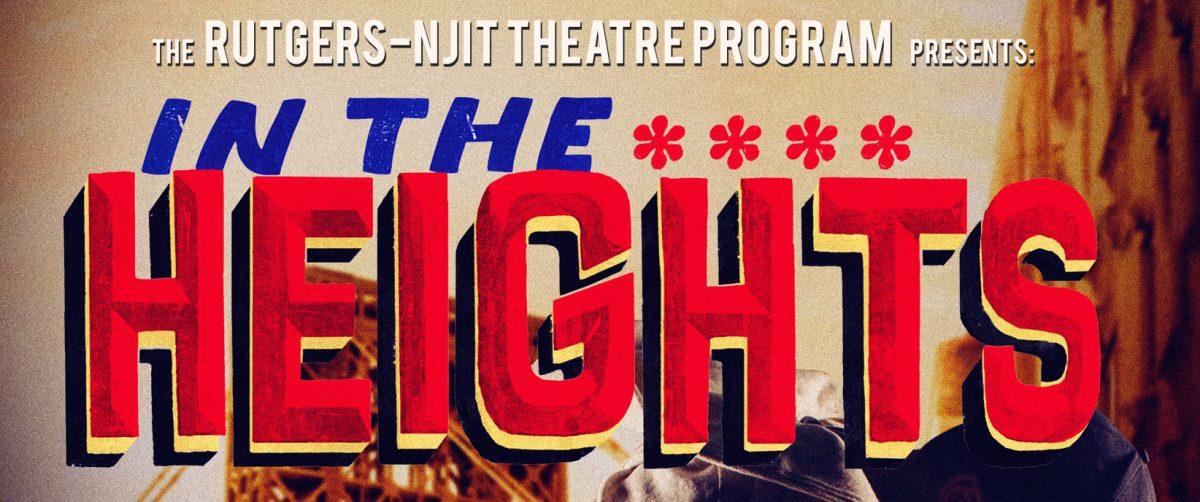In the Heights, presented by the RU/NJIT Theatre and Arts Technology program, took a creative and heart-wrenching, yet fun and light hearted approach to illustrate the struggle of “leaving home.” The Tony-Award winning musical, based on the book by Quiara Alegria Hudes, was directed by Michael Kerly, the Associate Director of the Theatre Program, and performed in NJIT’s Jim Wise Theater between February 28 and March 4.
The production used Afro-Latino and rap music, composed by Robert Felstain and Gonzalo Valencia, which was a refreshing surprise. The choice of music genre effectively connected the audience to the type of culture that one would find in Washington Heights. This effect was exaggerated with Spanish lyrics, particularly using colloquial slang, like in the song “No Me Diga,” a sort of Washington Heights spin-off of “Tell Me More” from the famous musical, Grease.
The choreography by Jacob Toth was especially effective at creating the Washington Heights “feel” when the characters were supposed to be dancing, particularly during the song “The Club” in which the four main characters dance salsa and more intimate night-club style moves.
A dinner scene in which the main female characters danced lightly to Spanish music emphasized the contrast between the old generation, complacent with living in the Heights, and the young and ambitious generation trying to get away. This is evident when “Abuela” comments on young Vanessa’s promiscuous dance style.
The central theme of “leaving home” was illustrated by the four main characters as they confronted their future. When Usnavi, hilariously named after his immigrant father’s misunderstanding of “US Navy,” finds that someone in the Heights won a $96,000 lottery ticket, the community goes wild with dreams about what they would do with the money. What first seems like a large sum is soon seen as a speck of what it would take to get the people from the Heights out of debt and living worry-free.
The financial dissatisfaction of everyone in the community begs the question, where is “up?” Is the goal to live on the upper East side, hiring maids and living in an expensive apartment “with exposed brick walls, like on purpose, not because it got all banged up?” Should efforts be focused on developing the community you came from, or getting as far away as possible?
By the end of the play, it became apparent that, although the younger generation has their own goals and ambitions to go to college or live elsewhere, they know that “home” will always be in Washington Heights. The Heights is where family waits, where the younger generations, off to create the life their immigrant parents always dreamt for them, can come back for support when they run into trouble. As Nina, a first generation college student, sings, “I found my island, I’ve been on it the whole time. I’m home.”
I personally found the content to be well balanced between intense scenes like Kevin nearly crying in character, with the comic relief offered by the Piragua salesman and the hair salon ladies. However, it was a little long for my liking, with a total of 27 songs. The set was clearly affected by a low budget, which I will not hold against the production. I believe certain improvements, like using a stencil or ruler on the business signs, would boost the visuals at no cost. I did appreciate, however, that the set design included modest porch steps, on which many heartfelt conversations were held, and a realistic bodega store front – the watering hole of the community.
This production included some surprisingly modern elements, such as 2018 bottled wine. Additionally, during a chaotic blackout scene in the club, the party-goers produced cell phones to light the stage with their flashlights.
Priyanka Racharla, a first year business major, expressed that this was one of her favorite scenes. “Most female actresses were wearing dresses where they could not hide their phones,” according to Marisa Sigas, who played Daniella. “The phones were kept hidden on the set and some females gave their phone to their male dance partner.”
Students who watched the play felt its message resonated with them,
“Through every song I felt the ups and downs that the community was faced with throughout the play”, said Bob Burghart, a third year Mechanical Engineering major. “I thought it was great. The singing and acting were all very good and had me engrossed in the story,” Thomas Schlein, a third year Computer Science major said.
Other comments included improvements for the set and visuals, however, the overall sentiment was that the play was touching and well done.



























